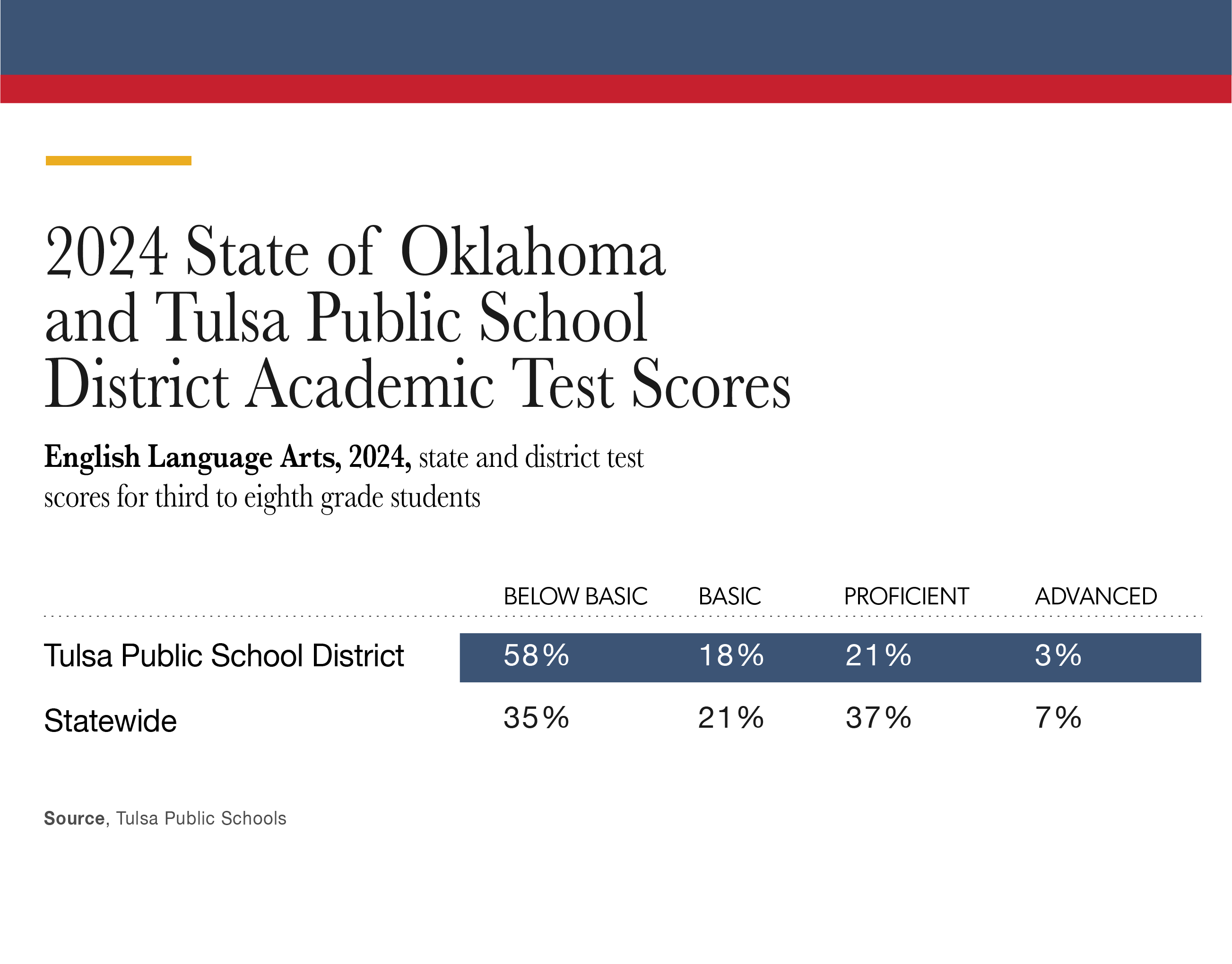
EDUCATION
John Neal, The Oklahoma Eagle
Photo Adobe Images
Faces Further Academic Challenges This School Year
Tulsa Public Schools improved student test scores by five percentage points as mandated by the Oklahoma State Board of Education (OSBE).
In a statement released to The Oklahoma Eagle late last week, TPS officials declared student test scores in English Language Arts (ELA) (reading/writing) have increased from 37% to 42% at the “basic and above” performance level.
The OSBE had singled out the Tulsa Public School District for test score improvements in 2024 while withholding a decision on district accreditation for the 2022-23 school year. In November 2023, the OSBE issued “orders” for TPS to take a series of academic corrective actions. Improving English Language Arts student test scores was one of the most important of the actions.
Now that the spring test scores have been recorded, the State Board will likely consider action on TPS accreditation at its next meeting scheduled for Sept. 26. Action on TPS accreditation has appeared on the board’s agenda every month since July 2023. Since last September, TPS officials have been required to make in-person monthly presentations on corrective actions.
State Superintendent of Public Instruction Ryan Walters had previously threatened a state takeover of TPS schools. But he has recently lauded the school district’s improvement efforts. Still, Walters and the OSBE have repeatedly stressed the importance of TPS test score improvements.
OSBE has also adopted new statewide rules enabling them to impose “academic deficiency” sanctions on school districts for poor student performance on Math and English Language Arts (ELA) state tests.
Student test results
While the Oklahoma State Department of Education (OSDE) has not released official school district results, TPS officials told The Oklahoma Eagle they were confident the required testing benchmark had been attained. The ELA scores under scrutiny were for third to eighth graders. The scores are sorted into four state-defined performance levels.
Using official statewide performance student test scoring results and preliminary data for the Tulsa Public Schools district, below are the comparative results for the 2023-24 school year.

Almost 300,000 were tested on ELA statewide, including approximately 14,000 in the Tulsa school district, the largest in the state. Because of methodology changes in scoring discussed later in the article, unadjusted year-over-year performance comparisons are not valid, according to education officials.
OSBE had required TPS to improve “basic and above” test scores to include at least 50% of its students or achieve a five-percentage point improvement.
New rules
The OSBE adopted this same rule for school districts statewide, first imposing it on the Tulsa Public Schools district. The rule applies to English Language Arts and Mathematics for the 2023-24 school year and will impact accreditation decisions as yet unmade by the OSBE. Typically, the board makes accreditation decisions in July of each year.
The new rule creates an “academic deficiency,” which, if not overcome by the school district, progresses to “accredited with warning” and then to “accredited with probation.” The new rule provides for “discretionary exemptions:
“If a school district receives an academic deficiency, it shall have the opportunity to provide written evidence to the State Board of Education showing that substantial changes have been made to improve academic performance to allow alteration of its accreditation status.”
“The Board may, at its option, request in-person presentations from a school district that has submitted written evidence.”
From the OSDE website, which provided raw test data, The Oklahoma Eagle staff also assembled composite performance level scores in mathematics for the Tulsa schools. The Tulsa school district had only 31% of its tested students scoring “basic or above,” far below the 50% or above threshold. While The Oklahoma Eagle staff did not assemble performance-level scores for other state school districts, scores of other school districts are expected to be affected by the new rules. (See https://theokeagle.com/2024/03/30/tulsa-public-schools-reckoning-imminent/ )
Tulsa Public Schools Superintendent Ebony Johnson has told the state board that a student functioning at the Below-Basic performance level does not mean they cannot read, write, or do math. Nor does it indicate that they are necessarily failing in class, she said. The state definition is, “Students scoring Below Basic may need targeted support in developing skills and abilities to bring them to grade level.” Critics charge the new rules punish school districts without providing the resources necessary to provide that targeted support.

Test score changes
In late August 2024, multiple media outlets began to report the OSDE had worked with the Commission for Education Quality and Accountability (CEQA) to change “cut scores’ separating one performance level from another (e.g., Basic to Proficient). In response to an Open Records Request by The Oklahoma Eagle, CEQA produced records reflecting “New standards were adopted by the OSDE.” OSDE staff and its external professional contract partner Cognia presented these standard changes to the CEQA, which under Oklahoma state law “shall have the authority to set cut scores” separating performance level labels. CEQA adopted new cut lines.
(See Education reporter for the Oklahoma Voice, Maria Martinez-Keel, who led state reporting on this: https://oklahomavoice.com/2024/08/21/oklahomas-education-department-quietly-made-changes-that-will-cause-big-jumps-in-state-test-scores/ )
Walters confirmed changes had been made at the August OSBE meeting but said no public announcement had been made because OSDE was busy informing school districts of the changes. The upshot of the changes was a dramatic improvement in the percentage of students scoring “Proficient” and, to a lesser extent, scoring “Advanced” on ELA and Math for 2024.
The Oklahoma Eagle confirmed this phenomenon by examining statewide and school district scores, including TPS, as reflected above.
The Oklahoma Voice, citing “internal state records,” reported this performance level improvement occurred while “records indicate actual academic gains have been stagnant.” However, no evidence suggests that changing the performance “cut scores” aided TPS in its remarkable achievement in ELA test score improvement.
The statement that TPS released to The Oklahoma Eagle last week said: “We know we still have a long way to go to support all of our students in achieving their full potential, and we are eager to continue that work. Our strategic plan requires that we continue to increase the pace of improvement in student learning. We are pleased but certainly not satisfied – there is much more greatness to come from Tulsa Public Schools.”










